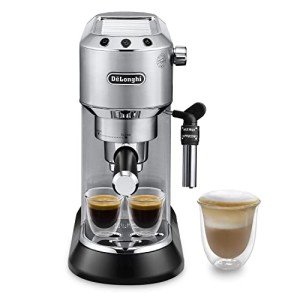The World of High-Quality Espresso Machines: A Comprehensive Guide
Espresso has become a beloved beverage amongst coffee lovers worldwide, understood for its abundant taste, extreme aroma, and adaptability. The heart of an excellent espresso lies in the machine used to brew it. High-quality espresso machines are created to deliver the best shot, making them a vital investment for coffee lovers. This post checks out various types of high-quality espresso machines, their features, upkeep pointers, and responses to frequently asked questions.
Types of High-Quality Espresso Machines
High-quality espresso machines fall into numerous categories, accommodating different choices, ability levels, and budget plans. The main types include:
| Type of Machine | Description | Suitable User |
|---|---|---|
| Manual Espresso Machines | Requires user skill to control extraction and pressure. Uses the most control over the developing process. | Experienced baristas and lovers |
| Semi-Automatic Machines | Combines manual operation with automation. Users manage the grind and tamping, while the machine deals with water dispersion. | Intermediate users |
| Automatic Espresso Machines | Automate the developing process, enabling for programmable brewing times and temperature levels. | Casual coffee drinkers |
| Super-Automatic Machines | Have integrated grinders and are totally automated, dealing with whatever from grinding to brewing and steaming. | Users seeking convenience |
| Commercial Espresso Machines | Designed for high volume use in cafes and restaurants, using resilience and speed. | Entrepreneur |
Comprehensive Overview of Each Type
Manual Espresso Machines
- Pros: Complete control over the developing procedure; can produce extraordinary quality espresso.
- Cons: Requires considerable ability; time-consuming.
Semi-Automatic Machines
- Pros: Balanced control, blending manual and automatic processes; exceptional quality espresso is still achievable.
- Cons: Requires some understanding and experience to master.
Automatic Espresso Machines
- Pros: User-friendly; decreases the learning curve while still producing high-quality espresso.
- Cons: Still needs some understanding of coffee-making fundamentals.
Super-Automatic Machines
- Pros: Maximal benefit; little skill needed; perfect for people or families who want coffee without hassle.
- Cons: Higher rate point; may do not have the fine-tuning abilities of manual machines.
Commercial Espresso Machines
- Pros: Built for longevity and performance; typically includes functions for high-volume turns.
- Cons: Expensive; might be overkill for home use.
Secret Features to Consider
When looking for a high-quality espresso machine, a number of crucial features should be considered:
- Pressure and Pump Type: Look for machines with at least 9 bars of pressure, which is necessary for drawing out the best flavor from coffee beans.
- Boiler Type: Single, double, and heat exchanger boilers each impact how the machine performs and the speed of developing.
- Construct Quality: High-quality materials such as stainless-steel are more effective for toughness and aesthetics.
- Alleviate of Use and Cleaning: Some machines require extensive cleansing, while others are created for easy maintenance.
- Temperature Control: Consistent temperature is vital; consider machines with PID controllers for accurate control.
Benefits of High-Quality Espresso Machines
Purchasing a high-quality espresso machine provides a wide range of advantages:
- Superior Quality: High-end machines enable higher control, leading to tastier espresso.
- Toughness: Built to last, quality machines need less repair work and replacements.
- Personalization: Users can enjoy a tailored experience by adjusting grind size, shot timing, and other settings.
- Increased Convenience: Automatic and super-automatic alternatives enable enthusiasts to delight in espresso with minimal effort.
Upkeep and Care for High-Quality Espresso Machines
To keep an espresso machine functioning efficiently, regular maintenance is crucial. Here are ideas for keeping a high-quality espresso machine:
Descale Regularly:
- Use a descaling solution every couple of months to prevent buildup of minerals from water, which can affect flavor and efficiency.
Clean the Brew Group:
- For machines with a detachable brew group, tidy it routinely to ensure a clean extraction.
Change Water Filters:
- Use a water filter and alter it as needed to reduce pollutants in your brewing water.
Daily Cleanings:
- Rinse the portafilter and group head after each use to prevent oil buildup.
Keep an Eye on the Parts:
- Monitor seals, gaskets, and other parts for wear and tear and replace them as required.
Frequently Asked Questions (FAQs)
1. What is the best espresso machine for beginners?
For newbies, a semi-automatic machine often offers a good balance of use and control, permitting users to find out the abilities necessary for making fantastic espresso.
2. Are super-automatic machines worth the investment?
Yes, for those who prioritize benefit and ease over control, super-automatic machines can be a deserving investment, specifically for households or hectic specialists.
3. Just how Espresso Maker Online should I anticipate to invest in a high-quality espresso machine?
High-quality espresso machines range substantially in price, with manual machines starting at a few hundred dollars, while super-automatic or commercial machines can go beyond numerous thousand.
4. Can I make other coffee beverages with an espresso machine?
Yes, lots of espresso machines have steam wands or accessories that permit users to create lattes, cappuccinos, and more.
5. The length of time do espresso machines typically last?
With proper upkeep, high-quality espresso machines can last over a years, making them a long-lasting investment in your coffee satisfaction.
High-quality espresso machines yield a transformative coffee experience, whether taken pleasure in in your home or in a commercial setting. By comprehending the types readily available, their features, and the upkeep required to keep them running effectively, customers can make educated decisions that raise their coffee-drinking experience.

